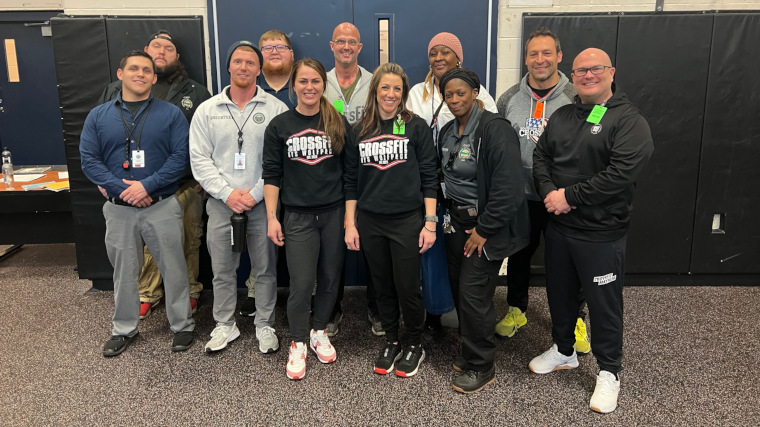Ohio Department of Youth Services Expands CrossFit Program to Three Juvenile Detention Centers
CrossFit DYS The Wolfpack isn’t your typical affiliate. It doesn’t have a website, and you won’t find much information about it elsewhere.
This is because the gym is located within a juvenile detention center, created by a program that has gained so much traction that it received government funding to expand to two other locations in Ohio.
The trauma-informed CrossFit program was launched by Matt Shindeldecker and Debbie Wagner in partnership with the Ohio Department of Youth Services and supported by Governor Mike DeWine’s office. Schindeldecker and Wagner are co-owners of CrossFit Crave in Celina, OH, along with the affiliates within the juvenile detention centers.

How It Started
The in-facility CrossFit classes first stemmed from a program CrossFit Crave launched for youth called Expanding Horizons, which were court-ordered CrossFit classes at the gym itself.
The program was so successful that it got the attention of the governor’s office after data showed the classes dropped recidivism rates in the county from 60-80 percent to 25 percent. Shindeldecker said he and Wagner were approached by officials from Governor DeWine’s office and state officials who then came to the gym to see the program firsthand.
“It took us about a year. We visited all the facilities, and the state decided to start with the Cuyahoga Hills Correctional Facility,” Shindeldecker told the Morning Chalk Up. “We visited there. We worked locally with CrossFit affiliate owners and coaches to decide who would be the best fit to run those classes, and then we opened an affiliate. Essentially, we own and operate CrossFit DYS The Wolf Pack inside the walls of that correctional facility.”
Shindeldecker and Wagner helped to hire a general manager and three coaches to run the program within the facility.
The youth at the facility range in age from 13 to 21, and the CrossFit program began as voluntary for kids referred to as “graduates.” These are the kids who graduated high school but can’t be released until they’re 21.
“These kids fell in love with CrossFit from the get-go. It gave them an outlet; it gave them something to look forward to,” Shindeldecker said.
The kids loved the classes so much that they sought to help coaches and staff set up a class for the weekends. While they can’t access any equipment without supervision, they are still able to come together to do a bodyweight workout.
One of the graduates led the class, and the original group of eight kids turned into 30 after about two months. The class, which was held on Saturdays, also allowed high school-age kids to join.
The popularity of the CrossFit class led the facility to ask the CrossFit coaches to take over the physical part of their physical education courses for the entire facility.
“They still have a PE teacher; they still meet the state guidelines and the state criteria for physical education in the classroom, which they do through their health class, and then we run their PE class. Now the kids in the school system can attend the class and it’s just been extremely successful,” Shindeldecker said.
Community Impact
The coaches at the juvenile detention facility have their L1 or L2 certification and go through mental health trauma training designed by Shindeldecker and Wagner.
“We found, realistically, in all demographics, but especially in this demographic, you have athletes who have unbelievable trauma. Some of it happened before they ever came to the facility, and sometimes it honestly can happen in the facility,” Wagner told the Morning Chalk Up.
She adds, “And at any time, any athlete can be triggered, or they have other things going on that a coach should probably just be aware of. So we developed an eight-hour trauma training that we offer, with the assistance of a local psychologist.”
The program recently secured more government funding to expand to two other juvenile detention centers in Ohio. The state approved $190,615.50 for fiscal years 2024 and 2025 combined, according to the agenda from the Ohio Controlling Board meeting schedule.
Shindeldecker and Wagner hope to expand the program to other states by collecting data, such as the impact CrossFit classes have on the kids’ sleep and behavioral changes.
“What we’re trying to do is give them a sense of belonging, a sense of accomplishment through the methodology of CrossFit and what we can do inside of a class. And that, for me, that’s the heart of the matter,” Shindeldecker concluded.
Featured image: Debbie Wagner